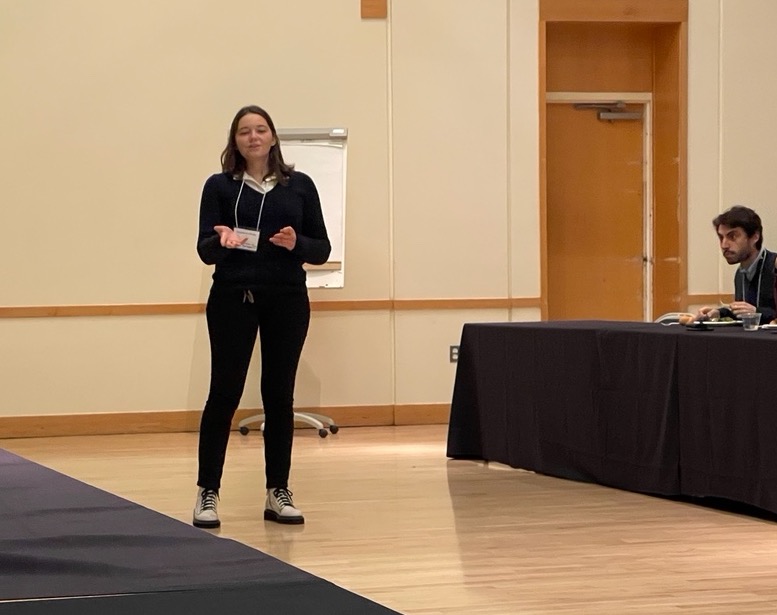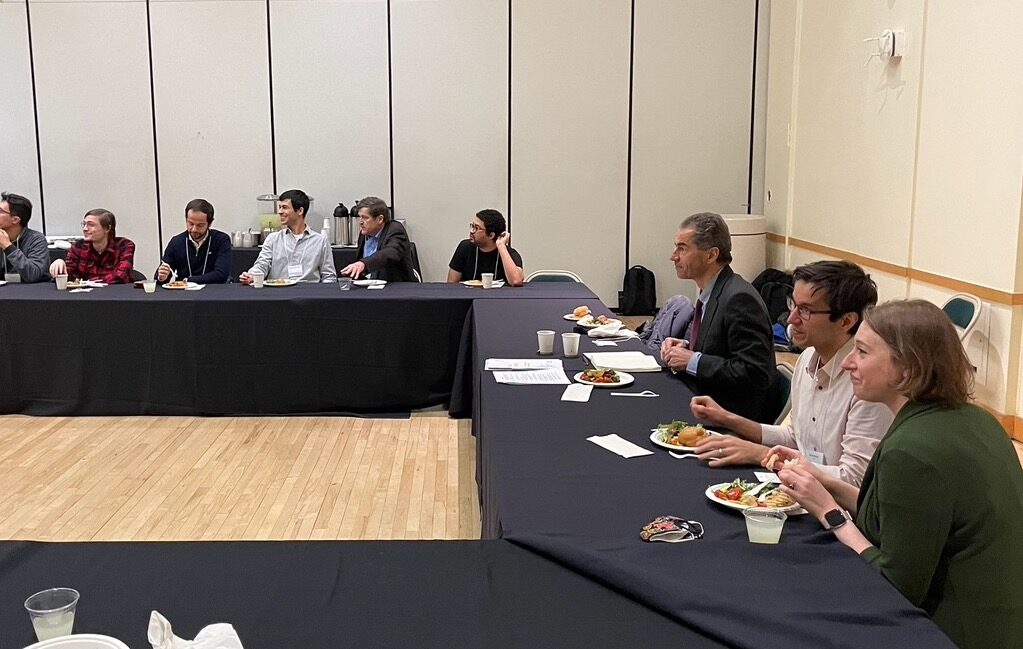 Maria da Loura Casimiro is a CMU Portugal Dual Degree Ph.D. student in Software Engineering at INESC-ID/Instituto Superior Técnico and the Software and Societal Systems from Carnegie Mellon University School of Computer Science. She started her Ph.D. in 2019 shortly after completing the MSc. in Electrical and Computer Engineering. This year, she presented her current work on “Self-Adaptive Machine Learning” to Feedzai under a meeting promoted by CAMELOT – a CMU Portugal large project promoted by Feedzai, where Técnico is one of the partner institutions.
Maria da Loura Casimiro is a CMU Portugal Dual Degree Ph.D. student in Software Engineering at INESC-ID/Instituto Superior Técnico and the Software and Societal Systems from Carnegie Mellon University School of Computer Science. She started her Ph.D. in 2019 shortly after completing the MSc. in Electrical and Computer Engineering. This year, she presented her current work on “Self-Adaptive Machine Learning” to Feedzai under a meeting promoted by CAMELOT – a CMU Portugal large project promoted by Feedzai, where Técnico is one of the partner institutions.
As a result of this meeting, she was invited by the company’s Chief Science Officer to do a 3-month summer internship to develop her ideas by leveraging a real industrial use case, an opportunity that she would not miss: “I had already discussed with my advisors the possibility of doing an internship at a company, not only because this was something that I was curious about and interested in doing but also because it would contribute to the fulfilment of one of my requirements at CMU. So, when I had the opportunity to do the internship at Feedzai, I was delighted and very excited. Feedzai is a rising company in the fraud detection domain (one of Portugal’s unicorn companies), I was going to be exposed to cutting-edge technology, and the topic of the internship was very much aligned with my PhD topic.”
Feedzai is one of the first startups founded under the scope of the CMU Portugal Program back in 2010. Nowadays, the company is the market leader in fighting financial crime, providing today’s most advanced cloud-based risk management platform powered by artificial intelligence and big data, which involves a constant need to improve its models and keep up with evolving financial frauds. According to Maria Casimiro, “Feedzai’s core business is not explicitly related to the work I’m developing. However, the technologies they leverage and the context in which they are used, constitute a possible use case for the work I’m developing, which is related to improving the operation of Machine Learning (ML) based systems, i.e., systems that rely on one (or more) ML components to operate”.
The project we assigned to Maria was a great challenge both for her and for Feedzai. It was completely uncharted territory, a new research line (Marco Sampaio)
At Feedzai, she was supervised by João Ascensão, Senior Director of Research and Marco Sampaio, Advanced Data Scientist. Marco referred to this experience as a challenge, adding that “the project we assigned to Maria was a great challenge both for her and for Feedzai. It was completely uncharted territory, a new research line.” Maria was involved at all stages. From defining the goals of the project, reviewing state of the art, and defining the detailed experimental setup. Maria kept a positive attitude from day 1, despite the great challenges she had to face since this was a very new experience. Namely, dealing with extensive industry datasets, a new use case (fraud detection), and very different and specific evaluation goals.”
Regarding the relevance of her research work to the company, Marco Sampaio explains that “Maria has been focusing on problems related to optimizing machine learning jobs usually related to parameter searches in a high dimensional space. This is a task that is relevant for most companies that leverage machine learning as part of their products, which is Feedzai’s case. The fact that Maria was familiar with these topics was relevant to start working on the project.”

On her side, Maria stated that the main goal of developing her ideas by leveraging a real industrial use case was highly achieved. She reinforces this idea that “By learning more in detail about how fraud detection systems operate and how fraud detection is performed, I was able to formulate better the research problems I was looking into and have specific examples from the fraud detection domain. Having these examples is extremely relevant to motivate the need for the work I’m developing and to communicate the challenges/needs to other researchers.”
This allowed me to understand how research is done outside of Academia. It was very fascinating to see how the whole team works together (Maria Casimiro)
Regarding this first professional experience in a company, she referred to it as a very positive experience that she highly recommends to other colleagues “I was fortunate to have the chance to do my internship with the research team at Feedzai. This allowed me to understand how research is done outside of Academia. It was very fascinating to see how the whole team works together and to understand the process of selecting the research projects that are expected to be the most successful. I learned a lot about what my strengths and weaknesses are. I learned new concepts and how to work with new platforms. For these reasons, I would advise my colleagues to have similar experiences.”
These kinds of internships are an important part of the company’s R&I strategy and are “often useful to try high-risk ideas in a time scoped manner, through simple experiments. This is very useful to diversify our projects and provide information on interesting new avenues to pursue”, explains Marco Sampaio.
This summer internship resulted from Maria’s connections established during the first two years of her Dual Degree Ph.D. Now into her third year, she describes the experience as challenging but very rewarding “I’m learning a lot about different areas of research, and specifically about the one I’m working in, but I’m also learning a very much about myself, and about what I want after I graduate.”
Maria Casimiro spent her second year at CMU, an experience that considered to be “eye-opening”, “From an academic perspective, it was very interesting to see how the requirements for Ph.D. students and what is valued by both professors and students differ between IST and CMU; how the interactions between Ph.D. students and professors are much more informal; and how there are always so many initiatives happening (e.g. talks). Additionally, I really enjoyed the courses I took there. The professors were very passionate about what they were teaching, and the classes were extremely engaging. From a personal perspective, it was very interesting to meet so many people from different backgrounds and to learn about American culture. One experience I will never forget is the Thanksgiving holiday, which I spent with a friend from CMU and her family. Being at CMU was an awesome experience and I’m glad I still have the chance to go back again.”
And plans for after graduation? “After graduation, I see myself embarking in Industry, perhaps doing research. Right after graduating, I would like to work abroad for some time, to gain more expertise, but I hope to stay in Portugal in the long run.”



























